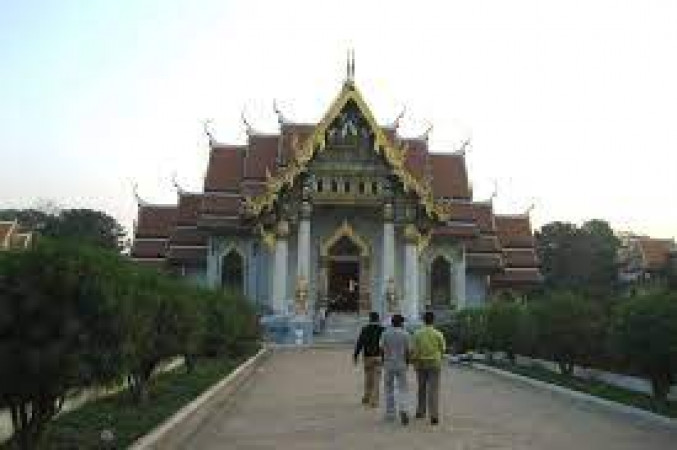
Thai Monastery Travel Guide
Thailand, known for its rich history, stunning geography, and vibrant culture, is a popular destination for travelers around the world. The country boasts ancient temples, lush jungles, and beautiful beaches, making it a diverse and fascinating place to explore. Thailand is famous for its warm hospitality, delicious cuisine, and bustling markets.Top Attractions in Thai Monastery
1. Wat Pho 2. Grand Palace 3. Chiang Mai Night Bazaar 4. Phi Phi Islands 5. Ayutthaya Historical ParkThai Monastery is Famous for
Its serene and spiritual Thai monasteries.Top Attractions in Thai Monastery
- Explore the stunning temples and palaces - Relax on the beautiful beaches - Immerse yourself in the vibrant street markets - Trek through the lush jungles - Dive into the crystal-clear waters of the islandsWhat's Great about Travelling to Thai Monastery?
- Rich cultural experiences - Stunning natural landscapes - Delicious Thai cuisine - Warm and welcoming localsWhat's Not So Great about Travelling Thai Monastery?
- Crowded tourist areas - Humid weather in certain seasons - Language barrier in some remote areasTravel Tips for Thai Monastery
- Check visa requirements before traveling - Use reputable transportation services - Stay hydrated and use sunscreen - Respect local customs and traditionsImportant Thai Monastery trip information
- Ideal Duration: A week to 10 days is ideal for exploring the major attractions.
- Best Time to Visit: November to February offers pleasant weather.
- Nearby Airports and Railway Stations: Suvarnabhumi Airport in Bangkok is a major entry point.
FAQ's on Thai Monastery
Q1: What is the best time to visit Thai Monastery?
The best time to visit Thai Monastery is during the cool and dry season, which typically runs from November to February. During this time, the weather is more comfortable for exploring the monastery and its surroundings. Additionally, many festivals and events take place during this period, offering a vibrant cultural experience for visitors.
Q2: Do I need a visa to travel to Thai Monastery?
Tourists visiting Thai Monastery may need a visa depending on their nationality. It is advisable to check the specific visa requirements for your country before traveling. Some nationalities may be eligible for visa-on-arrival or visa-free entry for a limited period. Make sure to have a valid passport with sufficient validity remaining.
Q3: What are the must-visit attractions in Thai Monastery?
Thai Monastery is home to stunning attractions such as the iconic Golden Temple, the serene Meditation Gardens, and the historic Monks' Quarters. Visitors should not miss the opportunity to witness the traditional alms-giving ceremony or explore the intricate architecture of the temple complex. The nearby Floating Market and Elephant Sanctuary are also popular destinations for tourists.
Q4: Is Thai Monastery a safe place to travel?
Thai Monastery is generally a safe destination for travelers. However, like any other place, it is important to exercise caution and be aware of your surroundings. It is advisable to avoid isolated areas at night and take necessary precautions with your belongings. Travelers are encouraged to respect local customs and traditions to ensure a safe and enjoyable trip.
Q5: What is the local currency in Thai Monastery and can I use credit cards?
The local currency in Thai Monastery is the Baht. ATMs are widely available in urban areas for cash withdrawal, and credit cards are accepted at most hotels, restaurants, and larger establishments. It is recommended to carry some cash for smaller vendors or markets that may not accept cards. Be sure to notify your bank of your travel plans to avoid any issues with card usage.
Q6: What is the local cuisine like in Thai Monastery?
Thai Monastery offers a diverse culinary experience with flavorful dishes like Pad Thai, Green Curry, and Mango Sticky Rice. Street food stalls and local markets are great places to sample authentic Thai dishes. Visitors with dietary restrictions can easily find vegetarian and halal options. It is customary to say "Aroy mak" (very delicious) after a meal to show appreciation to the chef.
Q7: What transportation options are available in Thai Monastery?
Transportation options in Thai Monastery include public buses, tuk-tuks, and motorbike taxis for short distances. Private taxis and car rentals are also available for more convenience. The city is well-connected by a network of trains and boats, making it easy to explore different parts of Thai Monastery. Travelers can also opt for guided tours or hire a local guide for a more immersive experience.
Q8: Are there any cultural norms or etiquette I should be aware of when visiting Thai Monastery?
When visiting Thai Monastery, it is important to dress modestly, especially when visiting temples or sacred sites. It is customary to remove shoes before entering religious buildings and show respect to monks and locals. Avoid public displays of affection and refrain from touching someone's head, as it is considered disrespectful. Learning a few basic Thai phrases like "Sawasdee" (hello) and "Kob khun krub/kha" (thank you) can also enhance your cultural experience. Embracing the local customs and traditions will enrich your journey through Thai Monastery.
Q9: I am a travel agent. How can I buy travel leads of Thai Monastery?
Register yourself as a travel agent at agents.tripclap.com and then you can buy travel leads to Thai Monastery once your account is approved. For more details contact our support team at +91-8069186564 or support@tripclap.com
